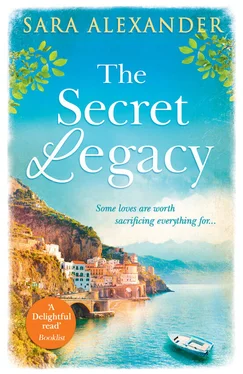Signora Cavaldi’s shop was a cavern carved into the stubborn rock that enveloped the cove of Positano. She held a prime position between the mill and the laundry, minimizing competition. I now wonder whether that had more to do with her careful management of the town’s politics and politicians, or her not so secret connection with the men who protected the trade and tradesmen. I wouldn’t like to guess whom she paid or how much, or indeed how much others paid her, but my instinct tells me her tentacles stretched far and wide. I arrived wearing the only dress I owned, a smock of doleful grey, which matched my mood. She gave me the once-over and pieced together an opinion as deftly as she would calculate someone’s shopping bill. The woman was a wizard with numbers, that took me no time to figure out, but she loathed children.
‘You’re twelve now, Santina, si ?’
‘ Si , signora,’ I answered, trying to stop my left leg from shaking. It was an embarrassing habit since I had succumbed to polio as a younger child, and my withered calf always revealed too much about what I was feeling at any given time.
‘You’re here to work, yes? I’ll give you two days to learn what we do, and I expect to never repeat myself, capisce ?’
‘ Si , I understand, signora.’
She set me to work immediately, sorting the produce, laying out chestnuts in baskets, polishing the scales that grew dirty again with the weighing of earth-dusted mushrooms. I cleaned the vats of oil, swept and scrubbed the floor. As the sun dipped she called out for me to light the stove in the kitchen of the apartment upstairs and brew a broth for dinner. At first it struck me as a little out of my remit – I had been told that I would be served food in return for working, and I will admit the idea of having regular meals was exhilarating. However, my own cooking skills were not well honed – Mother and I permitted ourselves a full meal maybe once a week, and meat was scarce. I stood, hesitant, before the stove, in a strange kitchen, not knowing where anything might be kept. I was loath to search amongst her things. I went downstairs. She scolded me for lacking initiative: ‘Look around you, mountain girl! We have a shop, the best grocer’s in the town. I have a clean kitchen, which you will keep pristine, and I want, thanks be to God, for very little. Don’t let me see you down here until dinner is served.’ And with that she turned back toward the broccoli rabe, placing them in neat lines inside wooden crates ready for the following day.
I fought with several pans, finely chopped as many of the vegetables I could find that would not be good for selling the following day, dropped in a fist of barley, lentils and parsley, and, eventually, there was a broth that would fill our stomachs. A little thin perhaps, and lacking in salt, as Signora Cavaldi was so quick to point out, but it was hot and reminded me that I was not on the mountains any longer.
I slept in a thin cot placed in the short hallway between Signora’s room and her son Paolino’s. It was draughty but nothing like the limp damp of our stone mountain hut. I didn’t hear my father’s drunken snores – that was a degree toward comfort. Nor could I hear the soft breath of my mother, or feel Marco’s fidgety feet scrambling against mine through his dreams. Silent tears trickled down my face. I felt the droplets inside my ears. I let the wetness dry there, hoping my prayers and love would reach Marco up in Nocelle, a thin line of golden thread. After a time I must have given in to sleep because the next thing I remember is Cavaldi blowing down her nose at me with strips of sun fighting into the hallway from her room.
The days merged into one, each as laborious as the day before. I was sent on deliveries, some as heavy as would warrant a porter and his donkey, but Cavaldi would not hear of it; if I had been sent down for her to look after then it was my duty to earn my keep. I built quite a reputation amongst the porters in town, who ferried supplies up and down the steep alleys around the village. They called me Kid, alluding to my climbing skills as well as my age. It made me think of my mother. I was growing, at long last, and I noticed my muscles becoming more defined and strong. Sometimes the young boys would laugh at me for doing men’s jobs. The local women were not so kind. The Positanese knew mountain people when they saw them. We had the outside about us, the air of the wild, a fearlessness which I’m sure was disconcerting. We lived closer to death than they.
When I turned sixteen, Paolino, who till then had paid me as much attention and courtesy as one might their own shadow, began speaking to me. It started in the spring, as we placed the first harvest of citrus in the crates. I liked to arrange them in an attractive pile, but Cavaldi always admonished me for trying to make art not money. I had a large cedro in each hand, what Americans always mistook for grapefruit. He called out to me, ‘Watch how you hold those fruits, eh, Santina? You make a boy have bad thoughts!’ I looked at him, appalled, more for the fact that he had spoken directly to me than the inappropriate remark. I couldn’t find an answer. I longed for my mother right then, to whisper a fiery return, but none came. I was mute. I had been silenced for the past four years. The sudden realization stung. I considered lobbing the fruits at him but channelled a pretence of calm. My cheeks reddened, which I know he mistook for paltry modesty, or worse, encouragement, then I fled back into the shop.
I don’t know whether it was my nightly prayers, the incessant daydreams of life elsewhere, the relentless beckoning of my sea and its daily promise of potential escape, or the simple hand of fate, but three years later, on the afternoon of Friday, 25 May – venerdi , named after Venus, harbinger of love and tranquillity – two gentlemen entered my life and altered its course.
Mr Benn and Mr George were art dealers from London. They wore linen shirts in pastel shades, hid their eyes behind sunglasses and spoke without moving their mouths very much. Mr Benn was the smaller of the two and always held his head at a marginal incline, as if he were trying to hear a song passing on the breeze or decipher messages from the shape-shifting clouds above. Mr George was very tall and looked like he would do well to eat more pasta. His movements were slow and deliberate, his voice full of air. They admired the dancing shimmer of our emerald sea, the yellow of the mimosa tree outside Cavaldi’s store, and knew that cedro fruits were for making exquisite mostarda, a thick jelly sliced thin to accompany cheese. I was easily impressed in those days.
During their stay in Positano, they made daily trips to the store, and I was happy to serve them because they always stopped to stitch together a frayed conversation in their limited Italian. They tried to tell me a little about life in London, whilst touching every cherry before judging which ought to be included in their half kilo’s worth. Their words spun another world before me, crisp, colorful pictures of a life I craved. I listened as Mr Benn offered a steady commentary on what Mr George was well advised to buy. It was a wondrous thing for me to witness lives that could afford a month’s stay in a tiny Italian town. All sorts of fantasies seared my over-used imagination when I served them, underscored with a restlessness that pounded louder for each day I remained within Cavaldi’s prison-like walls.
Every morning they would stop by and ask what they ought to cook with the fresh zucchini, whether the flowers were better in risotto or fried? How long I’d char an eggplant for, and which olive oil would be best for sofritto – finely cut celery, onion and carrot – and which best for drizzling over finely chopped radicchio? I began to look forward to their visits, a beacon of beauty amidst the relentless purgatory of life with Cavaldi. The obvious pleasure they took in enjoying our food made me feel proud. Their enthusiasm about our tomatoes made me wonder whether us locals appreciated the miracle of our bounty, as well as what on earth London art dealers must eat throughout the year to make our simple groceries so compelling?
Читать дальше












